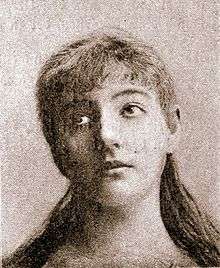Irene Abendroth
Irene Abendroth (1871-1932) was a Polish[2] coloratura soprano singer.[1] She was a pupil of Frau Wilczek. She was a member of the Vienna court opera in 1889, and she sang in Riga and Munich, and again in Vienna (1894-99).[1] She was engaged from 1899 to 1908 at the Royal Opera in Dresden.[1]
Irene Abendroth | |
|---|---|
 | |
| Born | July 14, 1871[1] Lviv (Lemberg) |
| Died | September 1, 1932 (aged 61)[2] |
| Nationality | Polish[2] |
| Occupation | Opera singer |
Her debut in March 1889 at "barely seventeen" as La sonnambula in Vienna, was critiqued as "extraordinary brilliancy of execution, in the best Italian manner, in smooth as well in staccato passages ...her voice is very thin" and she was given a distinctly favorable reception by the audience.[3] Following this performance, the Imperial Opera put "the youthful bravura singer" on trial for one year.[4]
Repertoire
- Vincenzo Bellini
- Norma (Adalgisa)
- Norma (Norma)
- La sonnambula (Amina)
- Gaetano Donizetti
- Lucia di Lammermoor (Lucia)
- Friedrich von Flotow
- Martha (Martha)
- Christoph Willibald Gluck
- Alceste (Alceste)
- Karl Goldmark
- Das Heimchen am Herd (Dot)
- Ruggiero Leoncavallo
- I Pagliacci (Nedda)
- Albert Lortzing
- Der Wildschütz (Baronin Freimann)
- Giacomo Meyerbeer
- Robert le diable (Isabella)
- Les Huguenots (Marguerite de Valois)
- L'Africaine (Selika)
- Wolfgang Amadeus Mozart
- Le nozze di Figaro (Susanna)
- Le nozze di Figaro (Gräfin)
- Don Giovanni (Donna Anna)
- Don Giovanni (Donna Elvira)
- Die Entführung aus dem Serail (Konstanze)
- Die Zauberflöte (Königin der Nacht)
- Otto Nicolai
- Die lustigen Weiber von Windsor (Frau Fluth)
- Giacomo Puccini
- Tosca (Tosca)
- Gioachino Rossini
- The Barber of Seville (Rosina)
- Ambroise Thomas
- Mignon (Mignon)
- Giuseppe Verdi
- Falstaff (Alice Ford)
- Un ballo in maschera (Amelia)
- Otello (Desdemona)
- Rigoletto (Gilda)
- La traviata (Traviata)
- Il trovatore (Leonora)
- Carl Maria von Weber
- Oberon (Rezia)
gollark: Implement osmarksISA™-2028.
gollark: Spontaneous tetrational apiogenesis.
gollark: Soul harvesters?
gollark: There are no negative side effects of that, except the negative side effects.
gollark: ↓ you
References
- Baker, Theodore; Remy, Alfred (1919). Baker's Biographical Dictionary of Musicians. G. Schirmer. p. 6. OCLC 19940414.

- Frank W. Hoffmann (2004). Encyclopedia of recorded sound. CRC Press. pp. 6. ISBN 978-0-415-93835-8.
- "Music in Vienna". The Monthly Musical Record. 19 (220): 81. April 1889. Retrieved 2010-03-10.
- "Music in Vienna". The Monthly Musical Record. 19 (225): 201. September 1889.
External links
- Irene Abendroth Recording from the Archive of the Austrian Mediathek: („Frag ich mein beklommnes Herz“ from The Barber of Seville)
This article is issued from Wikipedia. The text is licensed under Creative Commons - Attribution - Sharealike. Additional terms may apply for the media files.